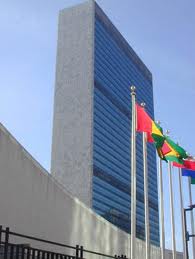
The U.N Resolution calls for withdrawal of Syrian forces who are fighting against the mercenaries under the patronage of U.S and its puppet regimes.
‘They wanted us to destabilize the Middle East, turn it upside down, make it under our control.’ Wesley Clerk – Former NATO Chief
On February 4,2012, Western politicians and journalists responded with outrage to the Russian and Chinese vetoing of a UN security council resolution calling for Syrian president Bashar Assad to step down as part of a ‘political transition’. UK foreign secretary, William Hague, said,
‘More than 2,000 people have died since Russia and China vetoed the last draft resolution in October 2011. How many more need to die before Russia and China allow the UN security council to act? (In reality it is not the common people but the armed thugs have taken up arms against the regime.)
‘Those opposing UN security council action, he added, will have to account to the Syrian people for their actions, which do nothing to help bring an end to the violence that is ravaging the country‘.
The corporate media took the same view. A leading article in the Independent commented:
‘Hillary Clinton described the vetoing of the UN resolution as a “travesty”. She is right. But this cannot be the international community’s last word.’
Curiously, while Hague talked of the West’s determination ‘to find an end to the violence’, and the media railed against the Russians and Chinese for failing to seek the same, almost no-one noticed that the resolution had itself subordinated the possibility of a ceasefire to the demand for regime change.
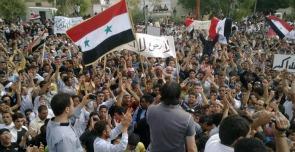 The draft resolution did call ‘for an immediate end to all violence’. But it specifically demanded ‘that the Syrian government (only)… withdraw all Syrian military and armed forces from cities and towns, and return them to their original home barracks’. The draft resolution did call ‘for an immediate end to all violence’. But it specifically demanded ‘that the Syrian government (only)… withdraw all Syrian military and armed forces from cities and towns, and return them to their original home barracks’.
This one-sided demand that only Syrian government forces should withdraw from the streets closely resembled the Machiavellian device built into UN Resolution 1973 on Libya, passed on March 17, 2011.
Further Measures
Returning to the vetoed UN resolution, the one-sided demand that Syrian government forces withdraw, but not the anti-government fighters, (not common people) ,was combined with the demand that the Syrian government ‘facilitate a Syrian-led political transition to a democratic, plural political system’ – regime change by any other name – ‘in an environment free from violence, fear, intimidation and extremism’. The draft text promised ‘to review implementation of this resolution within 21 days and, in the event of non-compliance, to consider further measures’.
The trap was clear enough – Syrian forces would have been ordered back to barracks. If the fighters had continued fighting and government forces had responded, this would have
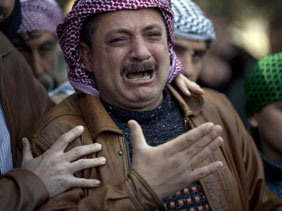 parente di Abdulaziz Abu Ahmed Khrer, ucciso dall'esercito siriano constituted ‘non-compliance’, opening the way for ‘further measures’, including foreign intervention leading to regime change. This would have given Syrian fighters (sponsored by U-S and its puppet regime) every motivation to continue the violence in hopes of triggering the kind of Western intervention that destroyed Gaddafi.
None of this should come as a surprise. For the West, a peaceful solution in Libya (as in Iraq) was perceived as an obstacle to the actual goal, regime change.
Milne (media lens) observed last August: ‘If stopping the killing had been the real aim, Nato states would have backed a ceasefire and a negotiated settlement, rather than repeatedly vetoing both. Instead, UN Resolution 1973 ‘has since been used as Nato’s fig leaf to justify the onslaught against Gaddafi and deliver regime change from the air’.
Consider, then, that we have strong evidence that the vetoed resolution on Syria would have escalated violence in pursuit of regime change (an illegal aspiration under international law). We have the clear example of Libya, from just last year, of very similar machinations producing regime change, a ten times increase in violence, and massive post-war chaos and violence.
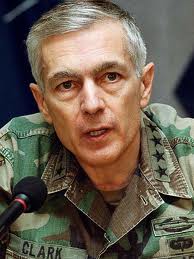 Gen. Wesley Clark If this isn’t enough to question the ‘black and white’ portrayal of the Russian and Chinese veto as a ‘travesty’, we can consider the filmed testimony of former Nato chief, General Wesley Clark, when he recalled a conversation with a Pentagon general in 2001, a few weeks after the September 11 attacks:
‘He reached over on his desk. He picked up a piece of paper. And he said, “I just got this down from upstairs” — meaning the Secretary of Defense’s office — “today.” And he said, “This is a memo that describes how we’re going to take out seven countries in five years, starting with Iraq, and then Syria, Lebanon, Libya, Somalia, Sudan and, finishing off, Iran.”’
He recounted a conversation he had had in 1991 with Paul Wolfowitz, then US Undersecretary of Defense for Policy, who told Clark: ‘we’ve got about 5 or 10 years to clean up those old Soviet regimes – Syria, Iran, Iraq – before the next great superpower comes on to challenge us’.
In response, Clark said he asked himself: ‘the purpose of the military is to start wars and change governments? It’s not to deter conflicts?’
Clark’s conclusion will be blindingly obvious to future historians, if not to contemporary journalists: ‘There are always interests. The truth about the Middle East is, had there been no oil there, it would be like Africa. Nobody is threatening to intervene in Africa. The problem is the opposite. We keep asking for people to intervene and stop violence. There’s no question that the presence of petroleum throughout the region has sparked great power involvement.’
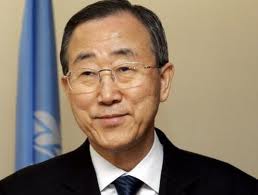 UN Secretary-General Ban Ki-moon In light of the above facts and arguments, it is interesting to consider the comments of UN secretary-general, Ban Ki-moon, who condemned the Russian and Chinese veto as ‘disastrous for the Syrian people’. The failure to agree on collective action, he said, had ‘encouraged the Syrian government to step up its war on its own people’.
With these words, the UN secretary-general told much about his own position. Such remark on Security Council resolution, by the secretary-general is uncalled for.
Honest analysis suggests serious room for doubt that the resolution unless vetoed (by Russia and China) might itself have been disastrous for the Syrian people.
Source: Media Lens
|
 Proutist Universal
Proutist Universal




